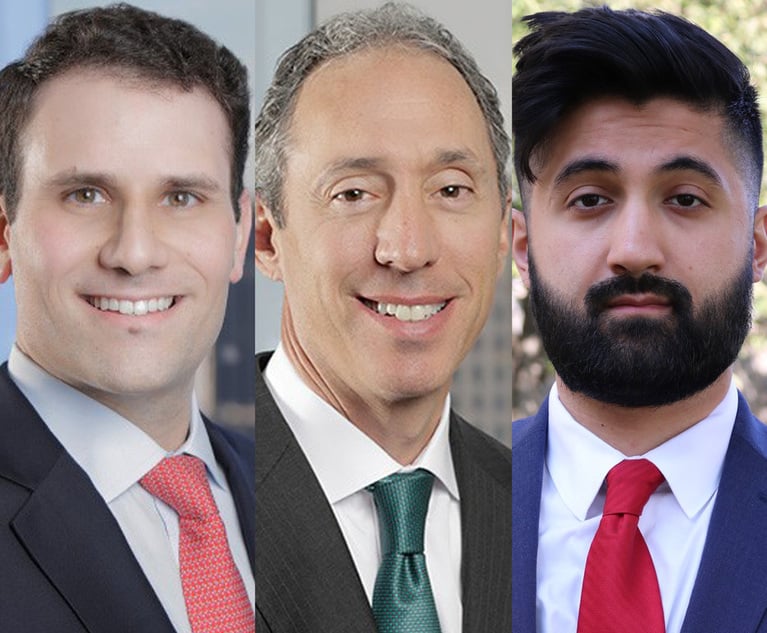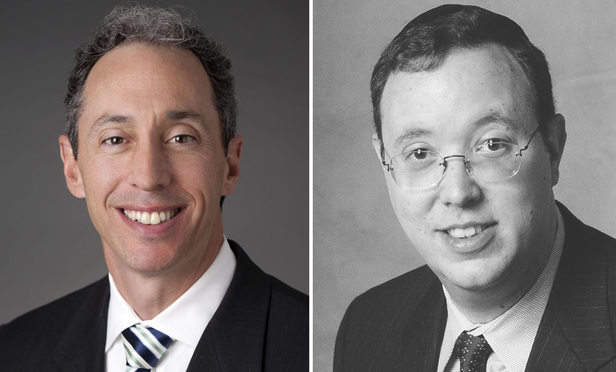Gregg L Weiner

April 05, 2024 | New York Law Journal
The Limits of Contractual 'Sole' Discretion Under the Implied Covenant of Good Faith and Fair DealingThis article explores the evolving contours of the implied covenant, as applied to discretionary contractual rights, and offers practical guidance for decision makers and counterparties to consider when dealing with contractual discretion.
By Gregg L. Weiner, Andrew S. Todres and Mohammed S. Hassan
8 minute read

November 05, 2021 | New York Law Journal
Discovery Stay in Securities Act Cases Remains a 'Pivotal' Issue After Case Settles Before U.S. Supreme Court ArgumentLitigants continue to wait for clarity on an important issue concerning cases brought under the Securities Act of 1933 in state court.
By Gregg L. Weiner, Adam M. Harris and Anne E. Conroy
9 minute read

March 17, 2021 | New York Law Journal
The Governor's LIBOR Legislation: Its Promise and Its LimitationsEven with all that the proposed legislation does to curb litigation and provide legal certainty for the parties to LIBOR-based contracts, economically aggrieved parties may still be financially motivated to sue—sometimes for very large sums of money—and will have legitimate arguments to bring.
By Gregg L. Weiner, John P. Bueker, Daniel V. Ward and Ethan Fitzgerald
8 minute read

November 25, 2016 | New York Law Journal
'Consent by Registration' Theory of Jurisdiction: Are Its Days Numbered?Gregg Weiner and Adam Harris explain why the "registration" theory for gaining jurisdiction over corporations is no longer viable under modern precedent and principles of due process, and further explores how courts have grappled with the issue.
By Gregg L. Weiner and Adam M. Harris
21 minute read

May 28, 2015 | New York Law Journal
Securities Fraud Cases Brought Under Item 303Gregg L. Weiner and Israel David analyze 'Stratte-McClure v. Morgan Stanley,' a decision that confirms that issuers and other market participants must be vigilant of disclosure obligations under Item 303 of SEC Regulation S-K, but also confirms that there are significant limits to the extent to which liability should be imposed on this basis.
By Gregg L. Weiner and Israel David
12 minute read

May 27, 2015 | New York Law Journal
Securities Fraud Cases Brought Under Item 303Gregg L. Weiner and Israel David analyze 'Stratte-McClure v. Morgan Stanley,' a decision that confirms that issuers and other market participants must be vigilant of disclosure obligations under Item 303 of SEC Regulation S-K, but also confirms that there are significant limits to the extent to which liability should be imposed on this basis.
By Gregg L. Weiner and Israel David
12 minute read
April 14, 2014 | New York Law Journal
Disclosing 'Trends' in Securities Offerings: Lessons From 'Facebook'Gregg L. Weiner and Israel David of Fried, Frank, Harris, Shriver & Jacobson write: 'Facebook' provides some important lessons concerning disclosures of a "trend" identified intra-quarter that has not yet materially affected revenues, sales, or income, but which arguably should be disclosed because such a trend is "reasonably expected" to have a material effect.
By Gregg L. Weiner and Israel David
17 minute read

February 27, 2014 | New York Law Journal
Meaning and Enforceability of 'Best Efforts' ProvisionsGregg L. Weiner and Joshua D. Roth of Fried, Frank, Harris, Shriver & Jacobson examine the murky area of New York law surrounding contractual best effort provisions.
By Gregg L. Weiner and Joshua D. Roth
13 minute read

November 05, 2013 | Commercial Litigation Insider
The Evolving Legal Landscape of "Best Efforts" ProvisionsIn their inaugural column for CLI, Gregg Weiner and Joshua Roth of Fried, Frank, Harris, Shriver & Jacobson write that despite the ubiquity of “best efforts” provisions, New York courts have cast doubt on their enforceability.
By Gregg L. Weiner and Joshua D. Roth
12 minute read
December 12, 2011 | New York Law Journal
Five Percent of What?Gregg L. Weiner, a partner at Fried, Frank, Harris, Shriver & Jacobson, discusses the Second Circuit's analysis of the materiality issue in Hutchinson and its interpretation of Blackstone, as well as some remaining tensions or ambiguities that may exist in the Second Circuit's case law in the wake of these two decisions.
By Gregg L. Weiner
13 minute read
Trending Stories
- 1Infant Formula Judge Sanctions Kirkland's Jim Hurst: 'Overtly Crossed the Lines'
- 2Abbott, Mead Johnson Win Defense Verdict Over Preemie Infant Formula
- 3Preparing Your Law Firm for 2025: Smart Ways to Embrace AI & Other Technologies
- 4Greenberg Traurig Initiates String of Suits Following JPMorgan Chase's 'Infinite Money Glitch'
- 5Data-Driven Legal Strategies
More from ALM
- Morgan & Morgan Class Action Attorneys Detail Pathway to Success Within Cybersecurity and Data Privacy Practice 1 minute read
- Holwell Shuster & Goldberg Partners Leverage 'Hostile' Witnesses to Secure $101 Million Verdict Against Walmart 1 minute read
- Legal Speak at General Counsel Conference Midwest 2024: Mike Andolina, Partner, White & Case 1 minute read



